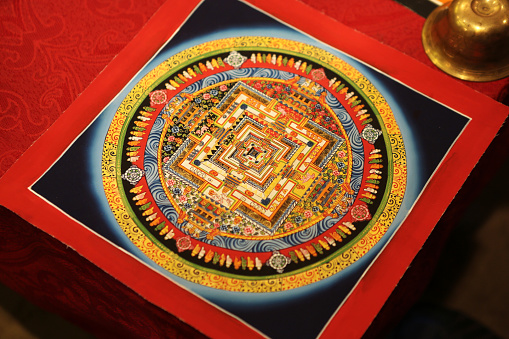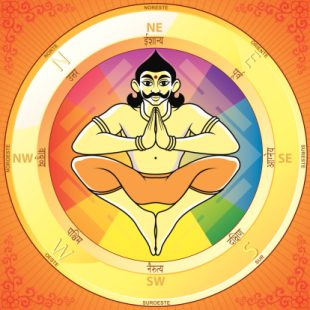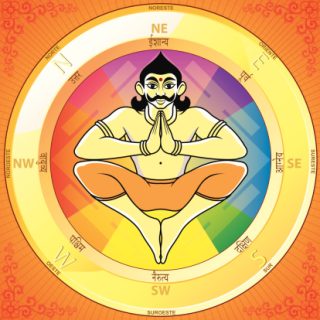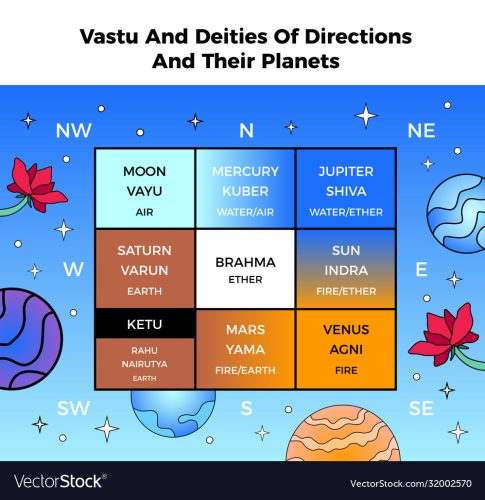
Right from the first property she ever purchased, Sheela Tanna has focused exclusively on spaces that are Vastu-compliant. The Juhu resident, who is a practicing nutritionist and fitness consultant, believes that living in Vastu-compliant spaces has worked well for her family; she believes this is particularly true for her son, who has recently bought a flat in the same neighbourhood as the family home. “My son is a chartered accountant and we were keen for him to live close to us. So, we inspected a number of flats, including one that was adjacent to our own. As soon as the flat was vacant, we inspected it with a specialist and found that it did not satisfy the requirements of Vastu. Although we had already paid a token amount for the property, we decided to stop the process right there and we started looking for another flat,” she says.
Vastu is a system of knowledge that dates back thousands of years, back to Vedic times. It’s traditional Indian geomancy – comparable to Chinese Feng Shui – which involves arranging architectural elements in such a way as to ensure that the flow of energy through a property is ‘positive’. Vastu experts guide people on how to arrange items in a home – they even guide architects and real estate developers on how to position constructions on a plot – so that energy flows through the space to result in benefits to the occupants’ health and financial situations. The idea is rooted in the idea that the ideal way of life involves living in harmony with nature, and Vastu is thus premised on the idea that everything, including human beings, are associated with the elements: prithvi or earth, agni or fire, tej or light, vayu which is wind and Aakash, which refers to ether. Collectively, these are known as the panchabhutas, and they are believed to affect the cosmic forces. Both, the shapes of structures as well as the directions they are placed in are believed to affect the way energies flow through spaces, according to Vastu.


Vastu is a system of knowledge that dates back thousands of years, back to Vedic times. It’s traditional Indian geomancy – comparable to Chinese Feng Shui – which involves arranging architectural elements in such a way as to ensure that the flow of energy through a property is ‘positive’. Vastu experts guide people on how to arrange items in a home – they even guide architects and real estate developers on how to position constructions on a plot – so that energy flows through the space to result in benefits to the occupants’ health and financial situations. The idea is rooted in the idea that the ideal way of life involves living in harmony with nature, and Vastu is thus premised on the idea that everything, including human beings, are associated with the elements: prithvi or earth, agni or fire, tej or light, vayu which is wind and Aakash, which refers to ether. Collectively, these are known as the panchabhutas, and they are believed to affect the cosmic forces. Both, the shapes of structures as well as the directions they are placed in are believed to affect the way energies flow through spaces, according to Vastu.
The Tanna family believes that the Vastu-compliant apartment they ultimately narrowed down on has truly proved lucky. “My son had been trying to get a job overseas for a while. Within just three months of moving into his home, he received a lucrative offer,” says Tanna.
Material gains are welcome, but that’s not the only reason prospective property buyers favour properties that have been developed and decorated with Vastu in mind. On my podcast on the subject, the late Dr Prabhat Poddar, who ran Akash Foundation, through which he guided individuals and organisations on various geomantic disciplines, throws more light on how Vastu can impact physical health and wellbeing. He cites the example of a physician friend in Germany, who has found remarkable success in treating patients in severe stages of cancer with a combination of Ayurveda, homoeopathy and wild plant therapy. The physician found that despite his efforts, the health of some patients declined after they were discharged and returned to their homes. “The doctor’s wife attended one of my courses on Vaastu and suggested looking at the [design of] patients’ homes. With Vastu-related interventions, we found that the patients continued to recover and even bounced back. The layout of their homes was affecting their overall health and wellbeing,” he says.
Harmony at home
The central idea, says Dr Poddar, is to harmonise the body space or ghata akash, the building space or griha akash and the universal space or maha akash. And architecture, he posits, can play a significant role in establishing this harmony. “Some of the most fundamental principles of Vaastu involve positioning fire in the southeast, water in the southwest, the air in the northwest, and sacred space in the northeast…. If we have washrooms and toilets in the southwest corner of a house, they can drain energy out of the body, resulting in digestive problems,” Dr Poddar says.

The central idea, says Dr Poddar, is to harmonise the body space or ghata akash, the building space or griha akash and the universal space or maha akash. And architecture, he posits, can play a significant role in establishing this harmony. “Some of the most fundamental principles of Vaastu involve positioning fire in the southeast, water in the southwest, the air in the northwest, and sacred space in the northeast…. If we have washrooms and toilets in the southwest corner of a house, they can drain energy out of the body, resulting in digestive problems,” Dr Poddar says.

He goes on to explain that if a home’s electrical mains are in the northeast direction (the direction that’s meant for your sacred space) or if this direction contains the fire element in the form of your kitchen stove, there is a likelihood that someone in the family may suffer from a serious ailment like cancer. Having drains, washrooms and fire elements in this area can also lead to asthma, heart problems, Alzheimer’s Disease and Parkinson’s Disease, he says.
A matter of perspective

As a science, Vastu is complex and while there are many theories about the logic behind it, there are no absolute answers. Nor is there, therefore, a book of rules that one can follow. However, Dr Poddar lays down a few basic steps to getting the Vastu right: Your bed should be in the southwest, but with your head placed towards the east or the south when you sleep, and you should not be met by a door or a mirror when you enter a space. The kitchen, he says, may be positioned in the northwest, since the fire and air elements complement each other, however, food should be prepared while facing the east. “This will safeguard you from headaches and migraines,” says Dr Poddar adding that it’s important to ensure that neither electricity mains, kitchen, drains or washrooms are towards the north, as these can drain out wealth.
As a science, Vastu is complex and while there are many theories about the logic behind it, there are no absolute answers. Nor is there, therefore, a book of rules that one can follow. However, Dr Poddar lays down a few basic steps to getting the Vastu right: Your bed should be in the southwest, but with your head placed towards the east or the south when you sleep, and you should not be met by a door or a mirror when you enter a space. The kitchen, he says, may be positioned in the northwest, since the fire and air elements complement each other, however, food should be prepared while facing the east. “This will safeguard you from headaches and migraines,” says Dr Poddar adding that it’s important to ensure that neither electricity mains, kitchen, drains or washrooms are towards the north, as these can drain out wealth.

As someone who works in the field of health and well-being, Tanna takes a more pragmatic approach. “If you consider the basics of Vaastu, you’ll see that the discipline essentially guides you towards ensuring that spaces get ample daylight and that air circulates well through them, i.e., that there is good cross-ventilation. It’s natural that these factors should contribute to good health, including improved mental wellness. One will find that he or she sleeps better and that his or her spirits feel elevated when you’re at home.”
See also: [Solve your Sleep Issues – Teach Yourself to Sleep]
Then why does she rely on Vastu at all? “We all like that feeling of extra security that comes from the knowledge that our homes or our spaces are safe and conducive to our growth and development as human beings,” says Tanna, adding an interesting note of caution. She says that it’s best to only visit a Vastu expert if you have the intention and the means to follow through on the advice you receive. “Otherwise, you may become plagued by constant fear that the space you’re occupying is not conducive to Vastu and therefore not optimal. This could affect your mood and energy levels negatively and then you may trigger some sort of self-fulfilling prophecy where everything gets affected negatively,” Tanna warns.
Most experts, however, do have simple fixes to offer when you need to adjust for large architectural changes that are simply not feasible. So, don’t be afraid to take this step towards your well-being. Listen to my podcast and write in if you’d like to know more.

